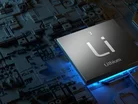How Lithium is Advancing the Global EV Revolution

Lithium is a soft, silver-white alkali metal. It is the least dense metal, is highly reactive and flammable, and must be stored in vacuum.
Worldwide lithium production in 2022 increased year on year by 23%, to approximately 130,000 tonnes. This was in response to strong demand from the lithium-ion battery market, which also increased the price of lithium, encouraging greater production.
Every 100,000 metric tonnes of lithium is enough to manufacture an estimated 12,500,000 EV batteries.
What is lithium used for?
Batteries
The most important use of lithium is for rechargeable batteries for mobile phones, laptops, digital cameras and, crucially, EVs.
Without lithium, the global bid to move away from the internal combustion engine to electric vehicles (EVs) is doomed.
According to the World Economic Forum, each individual EV battery requires around 8kg of lithium.
Dan Shine, President of Analytical Instruments at Thermo Fisher Scientific, caught up with EV magazine to discuss sustainable EV initiatives at play across the company.
“In one example, researchers are exploring the use of sodium-based batteries to replace lithium-based batteries,” Shine shared. “By using a more common and affordable element, sodium-based cells could help alleviate environmental stressors and eliminate the use of toxic lead making a cleaner and safer battery.”
Alloys
Lithium is made into alloys, being combined both with aluminium and magnesium for strength and lightness. Magnesium-lithium alloy is used for armour plating, while aluminium-lithium alloys are used in aircraft, bicycle frames and high-speed trains.
Glass
Lithium oxide is used in specialty glasses and glass ceramics.
Dehumidification
Lithium chloride is one of the most hygroscopic (absorbant) materials known, and is used in air conditioning and industrial drying systems, as is lithium bromide.
Lubricants
Lithium stearate is used as an all-purpose and high-temperature lubricant.
Medicines
Lithium carbonate is a mood stabilising medicine used to treat bipolar disorder, although how it works on the brain is not fully understood.
The biggest lithium mining companies
Jiangxi Ganfeng Lithium Company
Jiangxi Ganfeng is the largest lithium metal producer in the world. Based in China, its lithium compound capacity ranks third worldwide and first in China. In 2023 it reported revenues of US$7.5bn.
Albemarle
US-based Albermarle formed in 1994 and is the second-largest lithium miner in the world. It has three divisions: lithium, bromine specialties and catalysts. The company has over 5,000 employees in 100 countries and was the largest provider of lithium for EV batteries in 2020.
Tianqi Lithium
Tianqi is another Chinese giant, the world’s largest hard-rock lithium producer and holds resource and production assets across Australia, Chile and China.
How is lithium obtained?
Saudi Arabia's Crown Prince Mohammed bin Salman is dedicated to finding alternative sources of energy and is leaving oil in the ground. Recently, Saudi Aramco and Abu Dhabi National Oil Company teamed up to extract lithium from oilfield brine, as the Gulf states advance their move into electric vehicles production.
DLE
Direct lithium extraction (DLE) technology sees brine pumped into a processing unit where a resin or adsorption material is used to extract only the lithium from the brine. (Adsorption is the process by which a solid holds molecules of a gas or liquid as a thin film.) DLE technology offers higher recoveries and purities than other forms of lithium extraction.
Evaporation
Lithium is highly soluble, and as a result is present in sea water, which is why it is commonly obtained from brines. The traditional way to extract lithium from brine is through evaporation ponds.
There are environmental concerns over this method, with concerns that it harms the soil and causes air contamination.
Hard-rock extraction
Lithium extracted by ‘hard-rock’ comes from minerals hosted in Pegmatites. A pegmatite is a crystalline igneous rock similar to granite, and usually formed of quartz, feldspar, and mica.
The hard-rock method extracts lithium directly from pegmatites, using surface mining techniques. It is then processed into lithium hydroxide, the compound preferred by EV battery manufacturers.
******
Make sure you check out the latest edition of EV Magazine and also sign up to our global conference series - Sustainability LIVE 2024.
*******************
EV is a BizClik brand.
- BYD Surpasses Tesla in Quarterly Sales Amid EV Market ShakeuMobility
- SMMT: Car Manufacturing Challenges Amid Industry PressureMobility
- Charge Gully: Bridge EV Gaps for Deprived AreasCharging & Infrastructure
- Emporia & Treehouse Simplify Home EV Charging & InstallationCharging & Infrastructure

